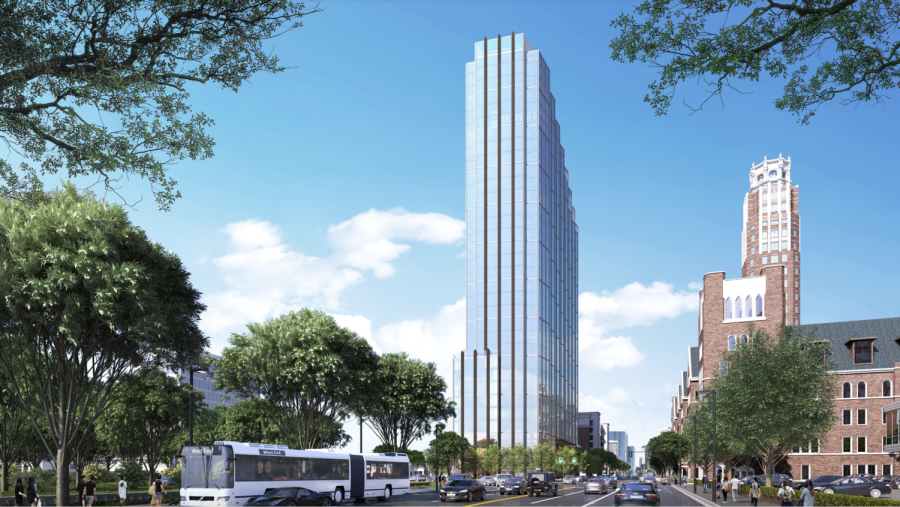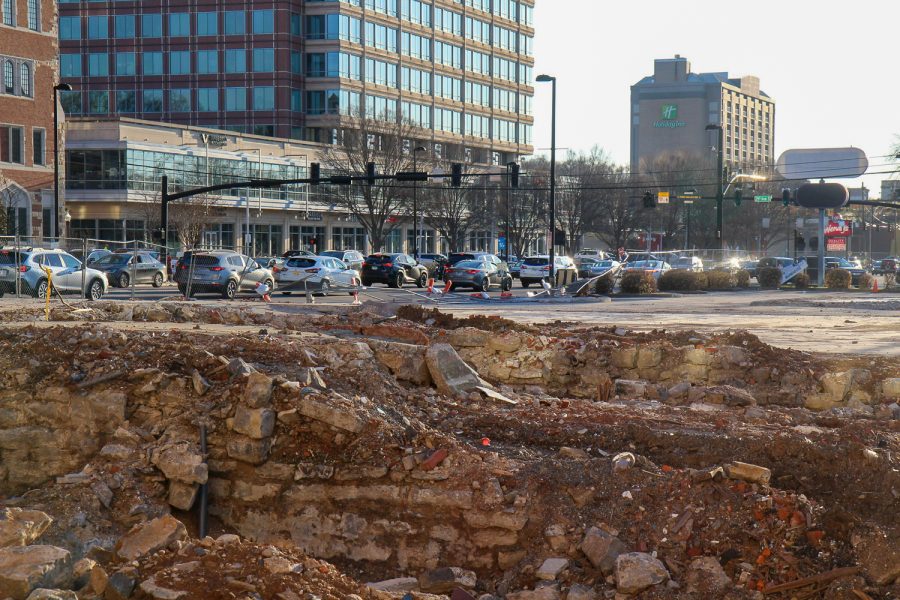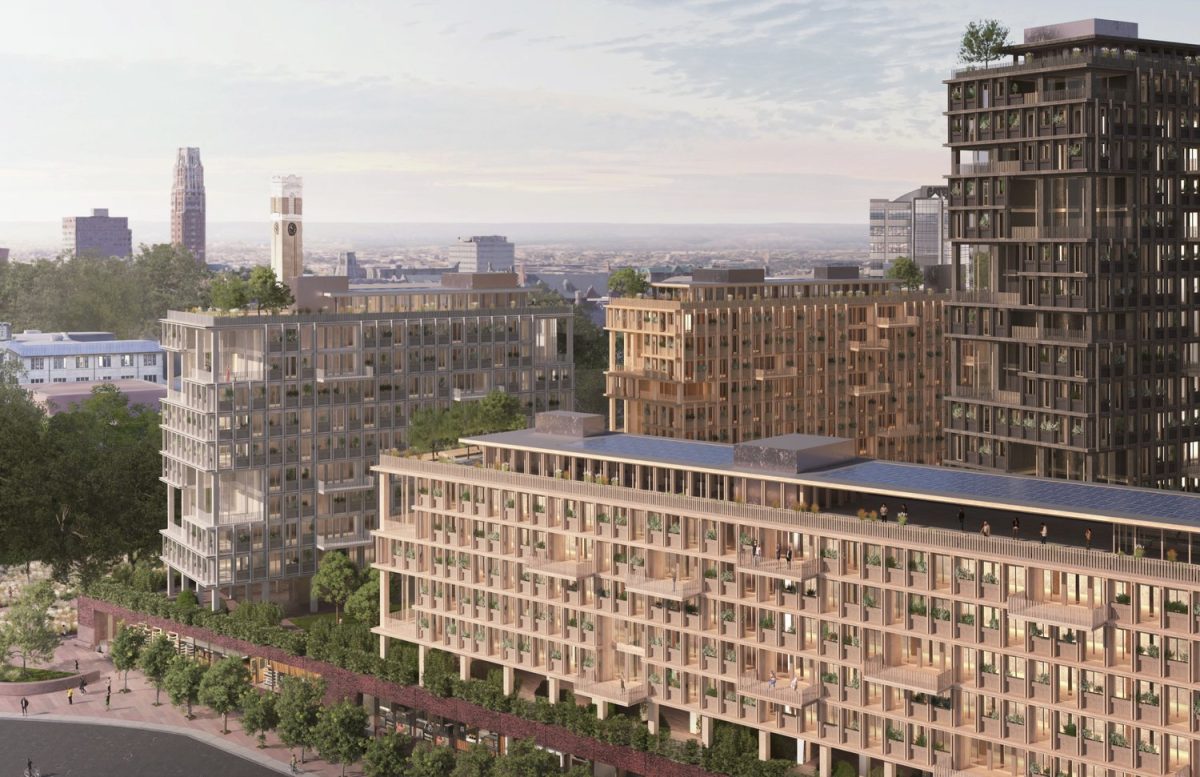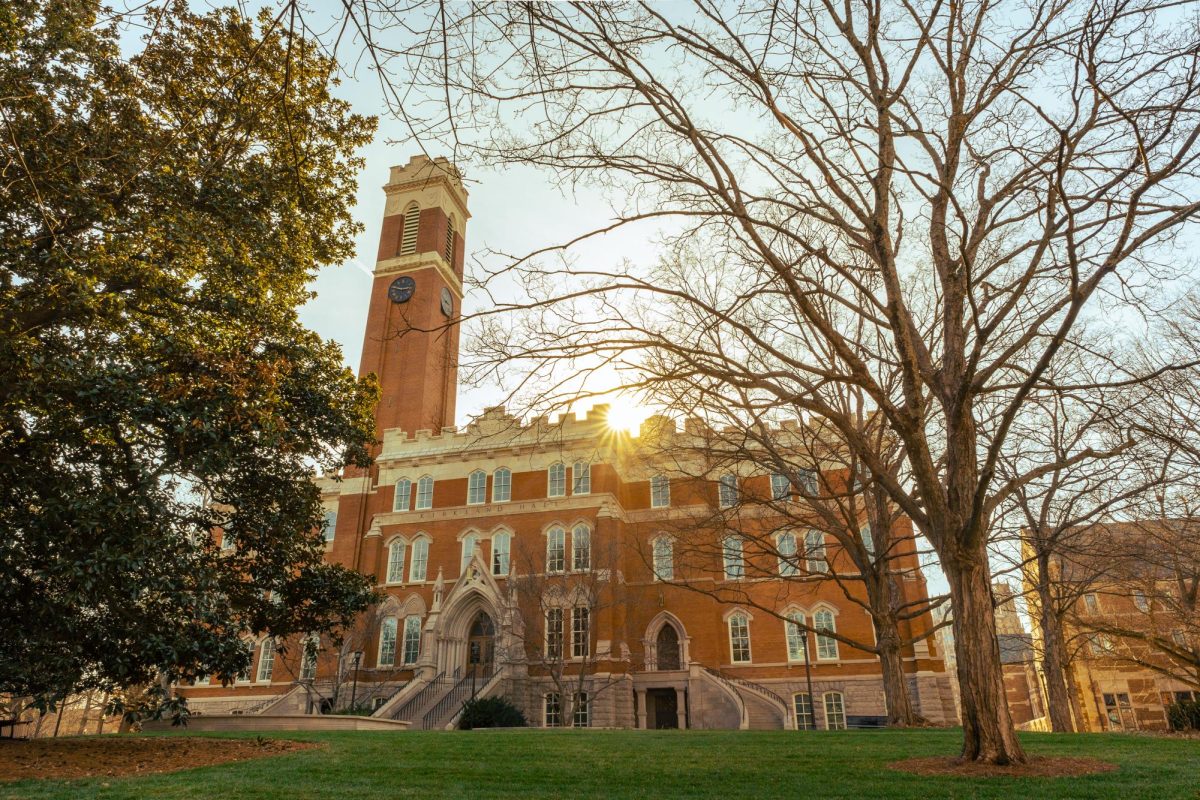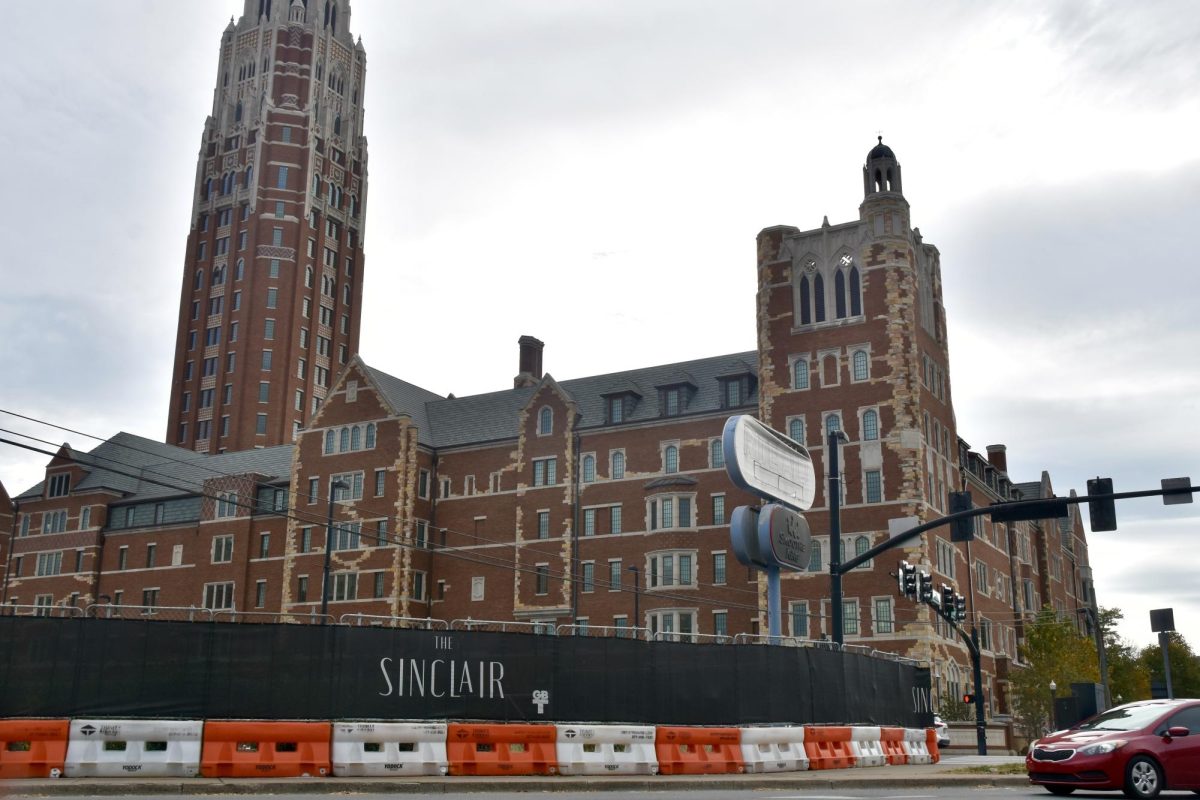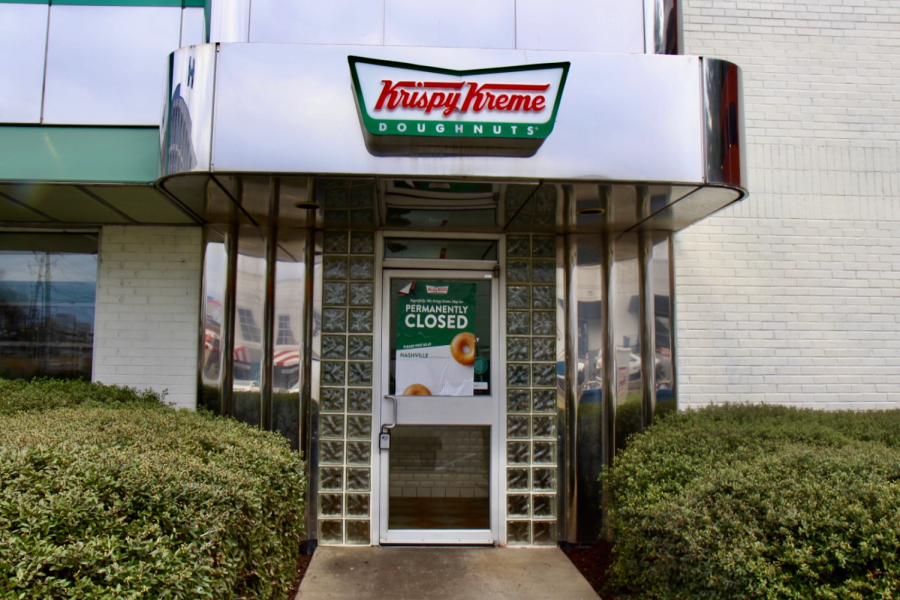Construction of The Sinclair, a 27-story entertainment and residential complex, is set to begin in 2023, according to Eric Spencer (‘04), GBT Realty Corporation’s vice president of investments and strategic planning. To be located at the intersection of West End Avenue and Elliston Place, The Sinclair will be 375 feet tall, with over 300 residential units, a rooftop pool and retail and restaurants on its ground floor.
The land where The Sinclair will be built formerly housed Emma’s Flowers & Gifts, Rite Aid, Smoothie King, Rotier’s and Gyros Kitchen Greek Cafe & Taverna. According to a Davidson County Register of Deeds document, commercial real estate firm GBT Realty paid nearly $15.9 million for these buildings. The lot formerly containing Emma’s Flowers & Gifts was approximately $18.4 million per acre, making it one of the most expensive purchases ever for Midtown property, according to the Nashville Post.
“I think The Sinclair is going to create a real sense of ‘wow,’” Spencer said. “You’ll have this beautiful, tall, rustic brick [Zeppos] compared to this shiny, new commercial and residential tower. I think those two [elements] are going to speak to what Nashville is: This call out to history with an eye on the future.”
The construction project was approved in December 2021 by the Nashville Metro Planning Commission. Spencer said that, although GBT Realty does not have an exact construction start date yet, construction is expected to take around 2.5 years to complete once it begins. He added that GBT Realty and Vanderbilt have been in close communication about the project and named Margaret Emley, Vanderbilt’s director of real estate, as one point of contact in these discussions. Emley did not respond to The Hustler’s request for comment.
“Vanderbilt has been a great partner when it comes to doing this site. We jumped in with them right from the beginning as soon as we acquired it to talk about what they would like to see,” Spencer said. “There’s going to be a lot of synergy between the university and The Sinclair — I’m sure we’ll have some residents that either work or go to school there.”
Effects on students
The Sinclair will be available for off-campus student housing, according to Spencer and Vanderbilt’s Office of Housing and Residential Experience.
Graduate Student Council President and third-year Ph.D. student Kyra Smart is a member of a newly formed housing working group chaired by Vice Provost Tracey George. She expressed hope that student feedback will be taken into consideration as building initiatives like The Sinclair arise.
“I would hope that by taking in student input from the recent survey that was sent out, more affordable housing specifically made for the Vanderbilt community will soon be available closer to campus,” Smart said. “The Nashville train of progress toward more tall-and-skinny houses and new skyscrapers will continue on, but Vanderbilt can still decide to prioritize its students above profits.”
Zeppos resident and junior Cameron Deal expressed concern over the construction’s effects on Zeppos College’s residential environment for the remainder of this semester and in future years.
“I don’t love it [the project] because I think the construction will be unpleasant to live next to,” Deal said.
OHARE said it has no influence over The Sinclair’s construction and the potential noise disruptions it will cause, as the project is not affiliated with the university.
“We are in contact with the company and will share updates with students regarding work hours,” OHARE said in an email to The Hustler.
History of development at Vanderbilt
Matthew Worsnick, assistant professor of the practice of the history of architecture, studies how architecture, urban planning, infrastructure and monuments construct spaces and are used to make claims to places. Wornsick said the construction of The Sinclair could be considered a realization of the vision of Vanderbilt’s founders.
“The trustees acquired this huge, mostly rural site at the edge of the city with the expectation that Nashville would slowly grow toward it,” Worsnick said. “You could see this building as the downtown finally finding the university.”
High-rise condos turn real estate into big money; flower shops and local bookstores and affordable diners don’t. For Vanderbilt to grow with the community as opposed to progressively separating from it, these locally functioning main-street-type services are necessary,” Worsnick said. “That takes a lot of people insisting that the long-term prosperity of the community takes precedence over short-term profits.
— Matthew Worsnick, art and architecture history professor
At the same time, he said the construction of the tower can be viewed as overshadowing, figuratively and literally, the university.
“Zeppos Tower won’t be the landmark that was hoped, especially considering that The Sinclair will be built immediately across the street — it blocks Zeppos completely when you’re approaching from the west, and from any other direction, Zeppos Tower will likely blend with the more prominent glass tower,” Worsnick said.
Wornsick said that the construction of The Sinclair might become a “call to action” for those who wish to preserve Nashville’s current landscape. He encouraged students and the university to take measures — including writing letters to city council members and attending Metro Planning Commission meetings — to protect small, local businesses from being acquired and demolished by bigger companies.
“High-rise condos turn real estate into big money; flower shops and local bookstores and affordable diners don’t. For Vanderbilt to grow with the community as opposed to progressively separating from it, these locally functioning main-street-type services are necessary,” Worsnick said. “That takes a lot of people insisting that the long-term prosperity of the community takes precedence over short-term profits.”
Urban planning in Nashville
Bill Purcell, former mayor of Nashville and professor in political science at Vanderbilt, acknowledged that Vanderbilt and the city of Nashville have grown together over the last several decades. He commended Nashville’s protection efforts around Broadway and his own neighborhood in East Nashville but also expressed regret over the loss of Midtown’s character due to Vanderbilt’s expansion and future Sinclair building.
“Midtown was a sort of marvelous streetcar suburb, but we didn’t respect or appreciate that at the time. It did not feel as though these last remnants were worth preserving given what had happened, given everything that’s already changed,” Purcell said.
There’s a point in time when it’s just time,” Spencer said. “At that point, it’s time to repurpose and reuse those sites, and I think what we have in store is going to be something special.
— Eric Spencer, GBT Realty Vice President of Investments and Strategic Planning
Spencer said that the owners of Emma’s and Rotier’s wanted to sell their shops and that Rotier’s closed before GBT Realty purchased its property.
“There’s a point in time when it’s just time,” Spencer said. “At that point, it’s time to repurpose and reuse those sites, and I think what we have in store is going to be something special.”
Senior Lecturer in American studies and history Mario Rewers said the construction of The Sinclair gives students insight into the trajectory of Nashville over the past several years.
“For people who have lived in Nashville for a while, it’s a cliche to say how much the city has changed in recent years. But most students aren’t aware of this fact. They take it for granted that Midtown is full of high-rises and that Broadway is full of bachelorette parties,” Rewers said. “I think the construction of The Sinclair is the first time that a lot of students are confronted with something that long-term residents of the city have experienced over and over again.”
I think the construction of The Sinclair is the first time that a lot of students are confronted with something that long-term residents of the city have experienced over and over again.
— Mario Rewers, Senior Lecturer in American Studies and History
Senior Charlotte Edmunds believes the consequences of the building’s opening will reach beyond the Vanderbilt community. She expressed concern over people renting out apartments in The Sinclair as Airbnbs, an issue explored in her honors thesis, as well as surges in the neighborhood’s cost of living.
“One of the biggest issues with Airbnbs is that they disrupt the fabric of a lot of Nashville neighborhoods. There’s streets in the Hillsboro area where people like to stay because it’s ‘cute,’ so people’s bachelorette parties disrupt their day-to-day,” Edmunds said. “Even if they [The Sinclair apartments] are not becoming Airbnbs, it changes the vibe.”











